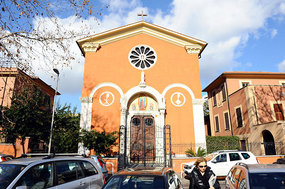 The other day I mentioned that cardinals receive a church in Rome for them to have pastoral solicitude for and to be a parish priest in the Diocese of Rome. The latter is really a fiction because the cardinal rarely has much to do his parish but this a vestige of a time when all cardinals were resident priests of Rome. Cardinal Mahoney never paid too much attention to his Roman church but Cardinal O'Malley shows up to his when he's in Rome.
The other day I mentioned that cardinals receive a church in Rome for them to have pastoral solicitude for and to be a parish priest in the Diocese of Rome. The latter is really a fiction because the cardinal rarely has much to do his parish but this a vestige of a time when all cardinals were resident priests of Rome. Cardinal Mahoney never paid too much attention to his Roman church but Cardinal O'Malley shows up to his when he's in Rome. Church (ecclesiology): February 2012 Archives
 The other day I mentioned that cardinals receive a church in Rome for them to have pastoral solicitude for and to be a parish priest in the Diocese of Rome. The latter is really a fiction because the cardinal rarely has much to do his parish but this a vestige of a time when all cardinals were resident priests of Rome. Cardinal Mahoney never paid too much attention to his Roman church but Cardinal O'Malley shows up to his when he's in Rome.
The other day I mentioned that cardinals receive a church in Rome for them to have pastoral solicitude for and to be a parish priest in the Diocese of Rome. The latter is really a fiction because the cardinal rarely has much to do his parish but this a vestige of a time when all cardinals were resident priests of Rome. Cardinal Mahoney never paid too much attention to his Roman church but Cardinal O'Malley shows up to his when he's in Rome. 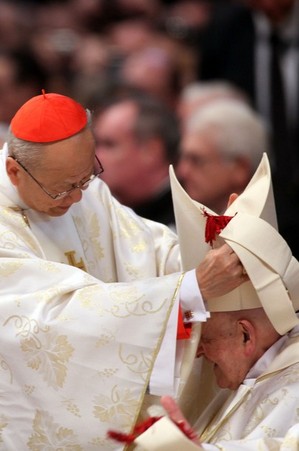
In a public Consistory the Pope created 22 new Cardinals today, though 4 are over 80 years of age and therefore cannot vote in a papal conclave.
At the ceremony in which the Pope creates a cardinal, each one is assigned a church in Rome, a titular or diaconal church. He becomes, in way, the pastor of a Roman parish and thus diocesan priests of Rome and therefore capable of electing the Bishop of Rome. This is "ecclesiology 101a."
The College of Cardinal is divided into three groups, cardinal bishops, priests and deacons. There is a dean and a vice dean of the College. Only by exception are cardinals not bishops or consecrated before being created cardinal per the Code of Canon Law (Cardinal Karl Becker was not consecrated a bishop prior to today's bishop and very often Jesuits created a cardinal who are 80 and above are typically dispensed from being consecrated; Avery Dulles was). Cardinal priests who are diocesan bishops of dioceses, while curial officials are made Cardinal Deacons.
The tradition of the Church is that after a number of years as a cardinal deacon one can be "promoted" to the order of cardinal priests. Some cardinals in key positions, such as the Dean of the College or prefect of an important Vatican congregation, e.g., CDF, are elevated to an open slot among the six Cardinal Bishops. There are seven cardinalatial titular dioceses, but by tradition the Dean always has two, Ostia and one other. There are also a four Cardinal Patriarchs of Eastern Churches, who rank in the College just after the Cardinal Bishops.
Tu es Petrus, et super hanc petram aedificabo Ecclesiam meam.
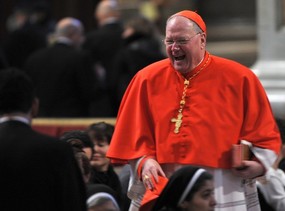
With these words the entrance hymn has led us into the solemn and evocative ritual of the ordinary public Consistory for the creation of new Cardinals, with the placing of the biretta, the handing over of the ring and the assigning of a titular church. They are the efficacious words with which Jesus constituted Peter as the solid foundation of the Church. On such a foundation the faith represents the qualitative factor: Simon becomes Peter - the Rock - in as much as he professed his faith in Jesus as Messiah and Son of God. In the proclamation of Christ the Church is bound to Peter and Peter is placed in the Church as a rock; although it is Christ himself who builds up the Church, Peter must always be a constitutive element of that upbuilding. He will always be such through faithfulness to his confession made at Caesarea Philippi, in virtue of the affirmation, "You are the Christ, the Son of the living God".
The words Jesus addressed to Peter highlight well the ecclesial character of today's event. The new Cardinals, in receiving the title of a church in this city or of a suburban Diocese, are fully inserted in the Church of Rome led by the Successor of Peter, in order to cooperate closely with him in governing the universal Church. These beloved Brothers, who in a few minutes' time will enter and become part of the College of Cardinals, will be united with new and stronger bonds not only to the Roman Pontiff but also to the entire community of the faithful spread throughout the world. In carrying out their particular service in support of the Petrine ministry, the new Cardinals will be called to consider and evaluate the events, the problems and the pastoral criteria which concern the mission of the entire Church. In this delicate task, the life and the death of the Prince of the Apostles, who for love of Christ gave himself even unto the ultimate sacrifice, will be an example and a helpful witness of faith for the new Cardinals.
A dear friend of mine, Father Richard Cipolla published an article today in the Wall Street Journal on what it means for a faithful Christian to belong to Christ faithfully, moving from an Episcopal Church to full communion with the Catholic Church and being a married Catholic priest. The life of sacrifice and joy is clear in Cipolla's story. For me, it is a testament of grace to know Father Richard and his wife, Cathy, and to have met his children. Wouldn't be good if all the clergy could say that with conviction and love. Last week Father Richard celebrated his anniversary of ordination to the Catholic priesthood on January 28 in the Diocese of Bridgeport. Let us pray for him and Holy Mother Church.
The WSJ article follows:
Being a Catholic Priest--and Married
The pope has created a new diocese for bringing Episcopalians into the church.
By Richard Cipolla
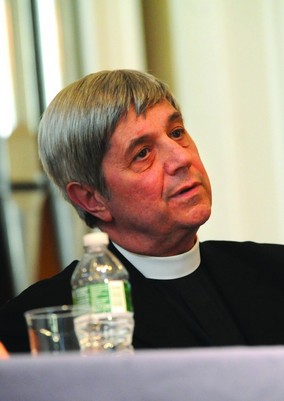
Last month, Pope Benedict announced the formation of an American "ordinariate," or special diocese for Episcopal congregations that want to move to Roman Catholicism (driven largely by Episcopalianism's liberal drift). These congregations, the pope ruled, could keep some of their Anglican liturgy. More significantly, a small but sizable number of married Episcopal priests will now become married Catholic priests.
As a married Catholic priest ordained in 1984 under a special provision set forth by Pope John Paul II (for individual priests, judged on an individual basis), I have closely followed Pope Benedict's announcement. I rejoice in this catholic and generous gesture by the pope and am overjoyed that these priests and their families will be welcomed into the Catholic Church. But that is not to say it won't bring its own share of challenges.
My experience as a married Catholic priest for 28 years brings to mind several thoughts, both practical and spiritual. First, the church must support new priests' families financially. During my first years as a married Catholic priest, there were times when we could not pay the heating bill. When I was ordained, it was made quite clear to me that I should not look to the church as my main source of income but rather to a full-time job outside of the church. My parish duties have thus always been secondary.
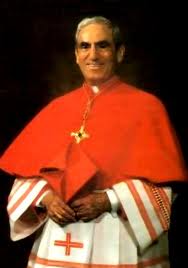
Last evening at 9:15pm, Anthony Joseph Cardinal Bevilacqua, 88, 7th archbishop of Philadelphia, died in his sleep in his quarters at Saint Charles Borromeo Seminary. He retired from his episcopal duties in 2003.
Philly.com has an extended article on the late Cardinal (1923-2012). He was appointed to the Archdiocese of Philadelphia in 1987 and installed in 1988.
The Pope's note of condolence to Archbishop Charles J. Chaput, OFM Cap, and the Archdiocese of Philadelphia:
HAVING LEARNED WITH SADNESS OF THE DEATH OF CARDINAL ANTHONY BEVILACQUA, ARCHBISHOP EMERITUS OF PHILADELPHIA, I OFFER MY HEARTFELT CONDOLENCES TO YOU AND TO ALL THE FAITHFUL OF THE ARCHDIOCESE. I JOIN YOU IN COMMENDING THE LATE CARDINAL'S SOUL TO GOD, THE FATHER OF MERCIES, WITH GRATITUDE FOR HIS YEARS OF EPISCOPAL MINISTRY AMONG CHRIST'S FLOCK IN PHILADELPHIA, HIS LONGSTANDING COMMITMENT TO SOCIAL JUSTICE AND THE PASTORAL CARE OF IMMIGRANTS, AND HIS EXPERT CONTRIBUTION TO THE REVISION OF THE CHURCH'S LAW IN THE YEARS FOLLOWING THE SECOND VATICAN COUNCIL. TO YOU, AND TO ALL THE CLERGY, RELIGIOUS AND LAITY OF THE CHURCH IN PHILADELPHIA, AND TO THE MEMBERS OF HIS FAMILY, I CORDIALLY IMPART MY APOSTOLIC BLESSING AS A PLEDGE OF CONSOLATION AND PEACE IN OUR LORD JESUS CHRIST.
BENEDICTUS PP. XVI
May God be merciful to His Eminence.


